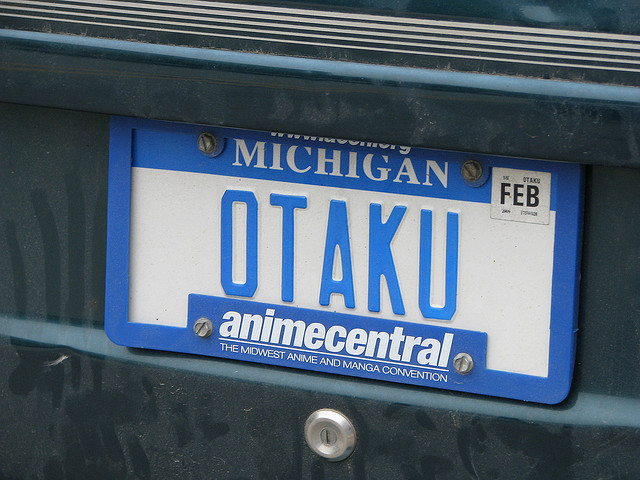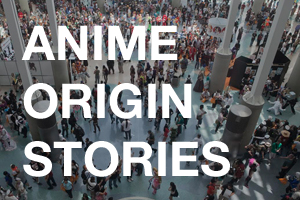Social media has made me change my mind about a lot of things.
It taught me that words I thought were harmless to say, like “lame” and “derp,” actually hurt a lot of people’s feelings. It helped me help my mom, who is a college psychology professor, create an informative lecture on gender dysphoria, something we weren’t knowledgeable about previously.
But most of all, it has taught me that the world is a lot bigger than my American education would have had me believe, with lots of diverse viewpoints and feelings.
As a person with a generally carefree life, I find myself stumbling over people’s toes on the Internet sometimes, saying or doing things that aren’t OK. And 99% of the time, as soon as I learn that something offends people, I stop doing it. The end.
But after Miyazaki’s tirade recently, I learned that “otaku” is a word that offends some people. And yet, I’m still using the term now.
It’s not just that it’s in the name of my blog, the book I’m about to publish, and my manifesto. I could change those. In the end, I decided that I won’t stop using it because I don’t believe it’s hurtful to people when I do.
When I discovered the loan word “otaku,” my thought was, “Finally! A word that conveys my meaning perfectly.” Sure, I still have to define it, but it’s worth it. Usually, when we say people are “geeks,” it’s usually about Star Trek or something. But you can be an otaku about absolutely anything. I may talk about anime most of the time, but my favorite reporting is when I’m writing about passionate people and their communities, whether I share their interests or not.
The main argument against somebody like me using “otaku” is about cultural appropriation. Western people have taken a lot of things already, the argument goes, so they shouldn’t be taking language, too. However, I think loan words are more of a give-and-take between cultures.
We’ve taken “Zen,” “tycoon,” and “otaku” from Japanese, granted they’ve lost a little of their meaning and spelling. Meanwhile in Japan, the word “viking” means “buffet” and the word “mansion” refers to what we’d call a condominium. And of course, this is to say nothing of English adoption of words like “Schadenfreude” and “Déjà vu.” And it’d be insular to say that people in other countries aren’t aware of these melding usages, or the way they sometimes change in meaning from nation to nation.
Otaku is a complicated word. It began as a self-referential term for fans with passionate interests, and is still primarily used that way. It had its share of bad publicity in the ’90s after a man who owned an extensive collection of video tapes—a few of which were anime—committed a series of grisly murders. The media dubbed him “The Otaku Murderer” and the resulting fracas caused a moral panic against otaku. (It’s just like how in the US, some politicians blame video games for violent crime, though crime happens so frequently that we’ve never had an iconic killer to call “The Video Game Murderer.”)
So yes, “otaku” hasn’t always been a positive word in Japan. But there, and in America, and in plenty of other countries like the Phillipines, it is used by fans and to refer to fans.
As Jennifu writes on Twitter:
@laureninspace I feel people took the revelation “otaku isn’t a great thing in Japan!” too far/overcompensated by thinking it’s a swearword.
— despair@hiki.otagirl (@zetsubouzhainu) February 5, 2014
And as Tony writes, anime characters use the term innocently enough, showing that anime producers doubt their viewers will find it offensive.
@laureninspace There was a scene in Fullmetal Alchemist where Ed calls Windy “engineer otaku” too! If only ppl paid attention to that!
— Tony Yao (@MangaTherapy) February 5, 2014
Mark pointed out that the same moral panic occurred in America around the same time, only there it was about Dungeons and Dragons:
@Kal5_ Same with Dungeons & Dragons: 1970’s it’s cool 1980’s news says all murdering satanists 1990 make feature films 2000s celebs play W/E
— MarkD555 (@Kal5_) February 5, 2014
But after all is said and done, I do still call myself the Otaku Journalist. I clearly have a vested interest in continuing to use the word. So don’t take my opinion as fact. Whether you continue to use it or not is a decision each fan will have to make on their own.
(Photo by HelloMokona.)
Discover more from Otaku Journalist
Subscribe to get the latest posts sent to your email.





8 Comments.
Good commentary on the word. It is ambiguous and there are those non-Japanese who try to define it purely as a negative. Even to the point to refer to anyone with poor social skills/grooming habits which has nothing to do with any of the historical uses of the term.
I also call myself an otaku. One of the best definitions I have heard is when a hobby shapes the direction of your life. My interest in anime and manga has done just that. I would not be writing and speaking about anime and manga or would I own so much material from and about Japan.
@Gilles, I’m glad you found a defining word that works for you! I think the reason that people like you and I feel strongly about it is because we see it as tied to our identities.
Great article.
There was a Japanese media backlash against the term, but I think there is now a more recent new backlash in the US. I feel it’s caused by the “sub-sub-culture” of Otaku that spend a bit too much time on cynical & culturally toxic image boards & forums.
People eventually take such hate and toxicity into themselves when exposed too long. Even if an individual knows it’s bad; when exposed constantly it becomes your new norm.
I don’t run from a word when the culture it describes becomes Ill. I will stand and fight. I’m an Otaku, and when I see hate, bullying, sexism, or racism I’m going to speak out about it. I’ve been around longer than the negative image for the word, and I’ll still be here when the negative image is gone again.
And self correction: The first feature film of D&D was in 2000 not 1990’s. But hopefully people get my point.
The negative image of a word comes and goes.
As long as the word origin isn’t a hateful one keep using it.
@Kaldar, I got your point at least! There are some words that will probably never lose their negative associations, but otaku isn’t one of them.
This post as well as your earlier one have been an interesting read, especially the comments on that earlier post. It’s pretty clear that ‘otaku’ has loads of different nuances, with the payload of each usage varying based on the individual who is speaking. I think your assertion that it’s not a dirty word is fair, though I don’t think it’s a 100% clean word, either. Otaku seems to be a word lost in the mist, caught between different cultures and interests – using it in certain contexts may require sensitivity and tact, but I don’t think it’s likely to harm anyone unless coupled with stronger language.
Here’s a personal anecdote that always popped into my mind when I read this discussion. It’s from my time in Japan as an assistant language teacher back in 2007:
One day in the teachers’ office I was speaking to one of my colleagues, a Japanese teacher of English (JTE). We were in the midst of planning a lesson about self-introductions, including talking about one’s hobbies. Upon discussing our own, the JTE and I realized that we both shared an interest in older anime series and building plastic Gundam models. My JTE next asked me if I was familiar with the word ‘otaku’, explaining that it might be used to refer to people like us, but that it wasn’t always friendly. I told him I knew the word, but that I personally was more likely to refer to myself with a term like nerd or geek. He was mildly surprised that I knew the word, so I mentioned that there were some people in the US who referred to themselves as otaku. He was again surprised, saying, “Huh, that’s a bit strange, ne? Why don’t they just call themselves nerds or geeks or something?” I replied that I wasn’t sure, but I guessed that it was because they wanted to more closely associate themselves with being fans of Japanese cultural exports.
Later, in class, the JTE and I performed our self introductions in both English and Japanese as examples for the students. Many of the students expressed surprise upon hearing their American teacher say that he built Gundam models, and my JTE took the opportunity to expand on the discussion. He said that both he and I could be considered Gundam-otaku (prompting a “he~!?” of disbelief from a few kids) but that didn’t mean that either of us were socially awkward, un-athletic, shut-ins, or any of the other negative stereotypes associated with the word. He reminded them that he was married and I had a steady girlfriend, that we both got along well with our coworkers, had good jobs, and both frequently did outdoor activities. Some students seemed entertained, others looked thoughtful, but it seemed clear that all had heard something they didn’t expect that day.
This was 2007 in rural Hokkaido and the kids were the equivalent of 8th or 9th graders, so analyze it however you want. I just think it’s interesting for including the reaction of a Japanese person to hearing that Americans use ‘otaku’ and also for examining how the perception of the term was clearly different between the teacher and some of the students.
@Patrick, that’s fascinating! It’s amazing how much power words can have.
Lauren, pulled some more info from my earlier research in regards to this same topic:
By the late 1990s, globalization played a part in redefining the otaku subculture (after the darker association with the Otaku Panic in ’89) as it rapidly migrated throughout the United States youth populace via importation of merchandise and television broadcasting. The emergence of Japanese youth struggling to re-define and re-shape themselves elicited questions of Japan’s future and how its young citizens would influence the perception of their culture while experiencing identity dissonance (contradictory feelings or discomfort due to a negative or vulnerable perception of one’s identity by society).